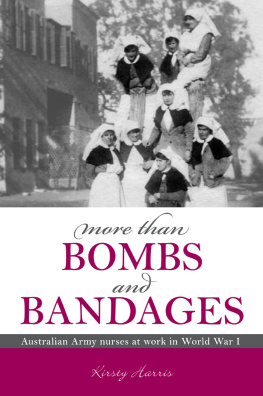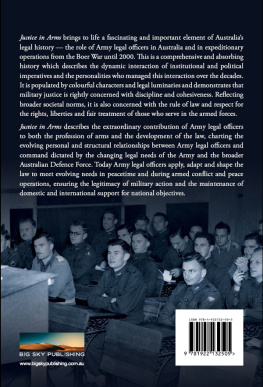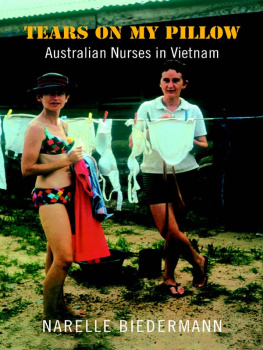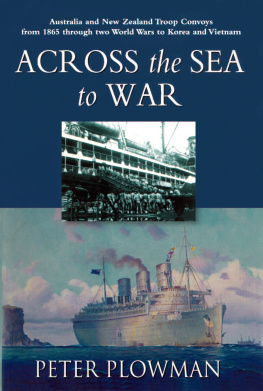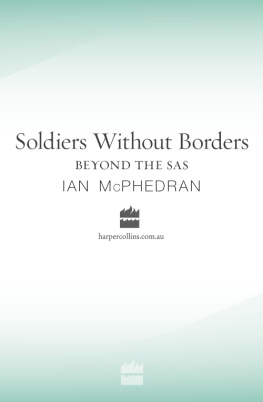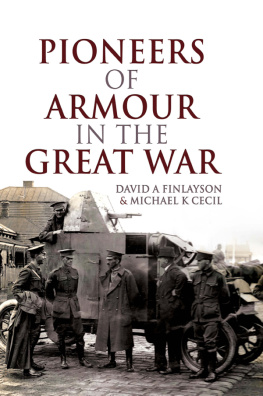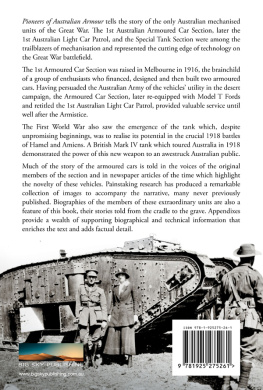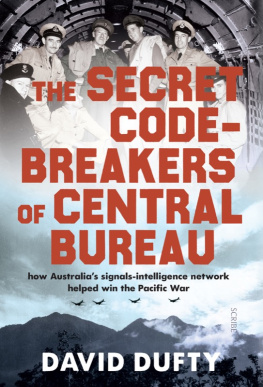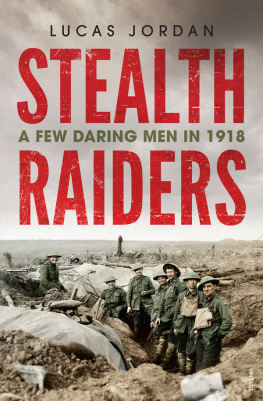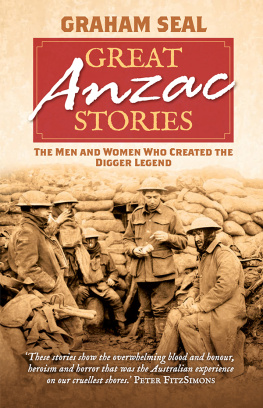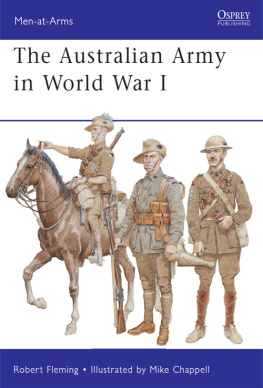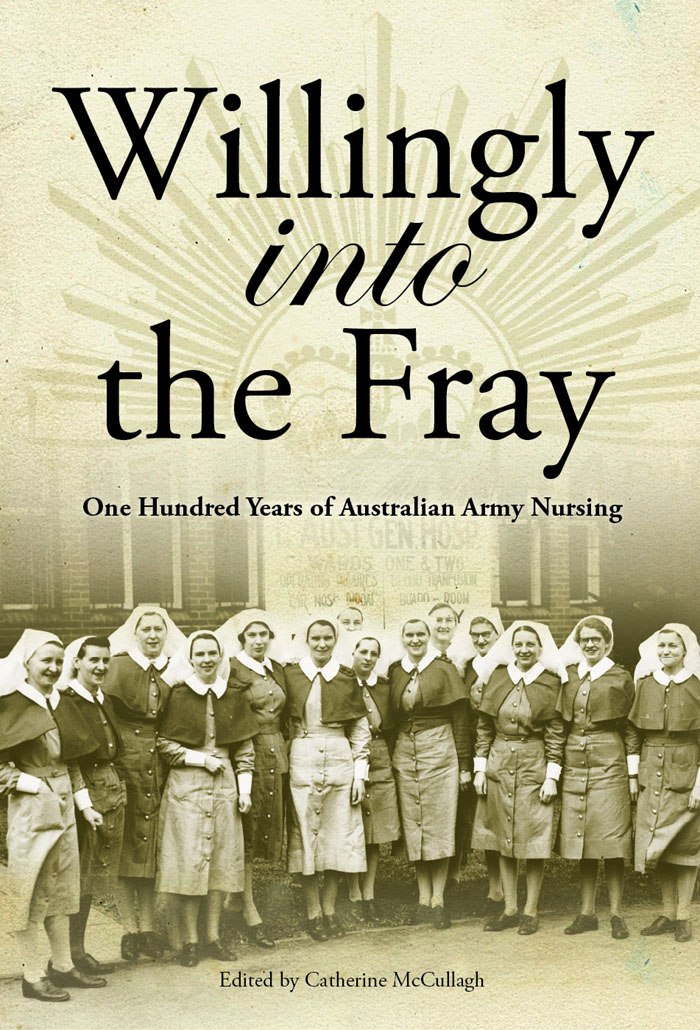Willingly into the Fray
One Hundred Years of Australian
Army Nursing
Willingly into the Fray
One Hundred Years of Australian
Army Nursing
Editor and Compiler
Catherine McCullagh

2010
First published in Australia 2010
by AUSTRALIAN MILITARY HISTORY PUBLICATIONS
13 Veronica Place, Loftus 2232 Australia.
Phone: 02-9542-6771 Fax: 02-9542-6787
Website: www.warbooks.com.au
Compiler and Editor: Cathy McCullagh
Copyright remains the property of the author and apart from any fair dealing for the purposes of private study, research, criticism or review, as permitted under the Copyright Act, no part may be reproduced by any process without written permission. All inquiries should be made to the publishers.
Printed in Australia by:
Typesetting by Margaret McNally, Canberra, ACT
Maps: Keith Mitchell, Canberra, ACT
National Library of Australian ISBN: 9780980658262
THE AUSTRALIAN ARMY HISTORY COLLECTION

Winning with Intelligence
Judy Thomas
Duntroon
Darren Moore
The Warrior Poets
Robert Morrison
The History of the Royal Australian Corps of Transport 19732000
Albert Palazzo
Defenders of Australia
Albert Palazzo
The Fight Leaders
D. Butler, A. Argent and J. Shelton
Operation Orders
Pat Beale
Little by Little
Michael Tyquin
Red Coats to Cams
Ian Kuring
Bowler of Gallipoli
Frank Glen
Vets at War
Ian M. Parsonson
Only One River to Cross
A.M. Harris
The Fragile Forts
Peter Oppenheim
Hassett: Australian Leader
John Essex-Clark
Persian Expedition
Alan Stewart
The Chiefs of the Australian Army
James Wood
Never Late
Gordon Dickens
To Villers-Bretonneux
Peter Edgar
Madness and the Military
Michael Tyquin
The Battle of Anzac Ridge 25 April 1915
Peter D. Williams
Doves Over the Pacific
Reuben R.E. Bowd
The Lionheart
David Coombes
Battlefield Korea
Maurie Pears
Chemical Warfare in Australia
Geoff Plunkett
A Most Unusual Regiment
M.J. Ryan
Between Victor and Vanquished
Arthur Page
Country Victorias Own
Neil Leckie
Surgeon and General
Ian Howie-Willis
Beyond Adversity
Bill Park
This collection is a joint venture between the
Australian Army History Unit
and Australian Military History Publications
Dedication
This book is dedicated to Australian Army nurses who have gone willingly into the fray for over one hundred years, serving diligently and with honour and with one thought only: to care for the victims of conflict, be they military or civilian, friend or foe. Australian Army nurses have served unstintingly despite the often appalling conditions of war and natural disaster and the absence of even the barest essentials. Gone are the flowing dresses and veils, gone also are the titles of matron or sister; what remains is the care, compassion and proud adherence to the motto of the Royal Australian Army Nursing Corps: pro humanitatefor humanity.
Wendy Taylor
Head of Corps
Royal Australian Army Nursing Corps
2003
Army Nurses If
If you can live in tents & think it great fun,
With ants & spiders crawling round your head,
With nothing but a string to hang your clothes on,
A canvas bunk on which to lay your head,
If you can shout with joy while you are washing
Among a lot of other naked frames,
And laugh when someone else has pinched your washer,
And treat it all as just a lot of fun & games,
If you can come a cropper on your backside
In mud, with at least one little curse,
Then happy soul, you really cant be normal,
Its plain to see youre just an army nurse.
Army sergeant (male) 1939/40
Contents
Foreword
The Royal Australian Army Nursing Corps (RAANC) celebrated its centenary in 2003 with a flourish of events held to mark this historic milestone. The concept of a book to encapsulate the essence and experience of the past one hundred years was proposed by Judith Spence, a passionate Nursing Officer who, with characteristic prescience, recognised the need to capture and preserve the stories of both RAANC veterans and currently serving members for the benefit of present and future generations.
Judiths idea became a reality through the expert editorial craftsmanship of Catherine McCullagh who drew on her own military background and used her fine writing skills to mould the abundance of written recollections and accounts into a sequence of compelling personal narratives.
This is truly a book that captures the rich history of the RAANC through the eyes of both veteran nurses from previous generations and todays Army nurses in the many personal accounts that fill its pages. There are stories that will touch your heart and make you cry. Others will make past events live and will add colour to the sepia images of the history books. Many stories will make you laugh and warm you with a humour that is typically Australian.
This is a rare opportunity for you, the reader, to take a personal journey through the lives of Army nurses from the early days of 1899 to modern times, and to experience for yourself the vast changes in society that accompanied those hundred or so years. Along this journey you, too, can experience first-hand the emotion, the care, the frustration and the joy of being an Army nurse.
I hope you enjoy your journeyI certainly have.
Beverley Wright, CSM, RFD
(Director of Australian Defence Force Nursing 20037)
Canada, February 2009
Introduction
The role of the Army nurse is unique. As Korean War nurse Dita McCarthy remarked, the bond between the soldier and the nurse is extraordinarily close, forged under fire and through the haze of suffering. The nurses themselves consider this a privileged position. They cherish their ability to serve close to the fighting, in harms way, a constant theme of these stories and one that inspired the title for this collection: Willingly into the Fray.
There are many erudite volumes that tell the story of the military nurse; yet most of these adopt an historical or medical perspective and the voices of the nurses themselves are heard only occasionally. Author Ruth Rae wrote with some indignation of the many historians who documented the death of Major General Sir William Throsby Bridges at Gallipoli in mournful detail yet had no idea of the name of the nurse who cared for him on the hospital ship Gascon as he lay dying. Adds Rae in a further salvo, What surprises me more is that no-one has asked. There are, of course, notable exceptions, including the superb Guns and Brooches and Ruth Raes own book, Scarlet Poppies. In Willingly into the Fray, however, the historical events that lend a vivid context to the nurses experiences are viewed through their eyes and described in their voices. Thus the reader enters the immediate world of the nurses themselves. Some of the descriptions are so graphic and evocative that smells, sounds and sights almost seep through the words on the page.
While Willingly into the Fray sets out to gather crucial memories and document the experiences of many of the nurses who served, particularly in the Australian Armys more recent campaigns and deployments, the stories are also important in recording the signposts of what Beverley Wright refers to as the evolution in military nursing. Certainly medicine and nursing techniques have evolved dramatically over the hundred years covered by this bookthe two world wars alone ensured this. Yet a major shift has also taken place in the identity of the patient: Army nurses now no longer simply care for wounded soldiers. This shift has, to some extent, been hastened by the urging of the nurses themselves and by the change in public consciousness as a result of a more pervasive media presence. The accounts of the nurses who deployed in the 1990s, in particular, often tell the tale of those who argued for the right to treat the civilian inhabitants of the war-ravaged countries in which they served. As the later stories attest, it was a fight they won. Yet this was not a victory to be savoured, as their role now encompassed caring for wild-eyed refugee children and the shell-shocked and dispossessed people who daily faced a battle for survival and for whom there was often no hope of a future. The nurses now confronted the question of bandaid medicine: they were few in number with limited resources and faced an endless sea of pleading, desperate people who believed that these camouflage-clad ministering angels represented the key to their very survival. Many of the nurses returned to their homes at the end of their deployment haunted by one burning question: did we make a difference? The answer to this soul-searching question lies not in the documented statistics of war and disaster relief, but in the individual lives that have been touched.


